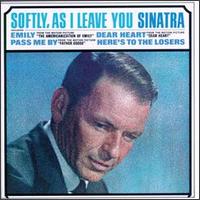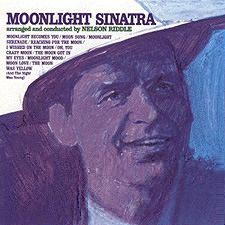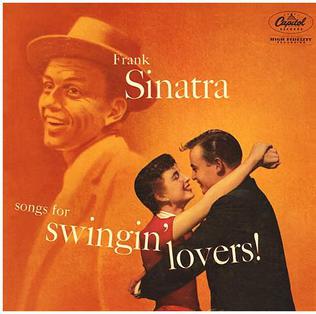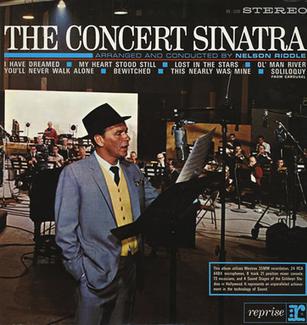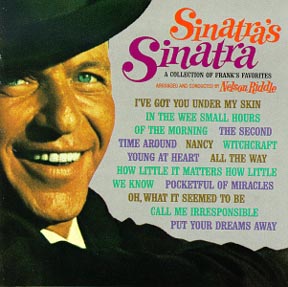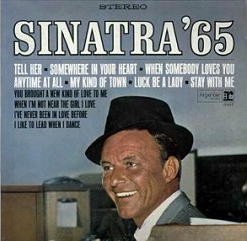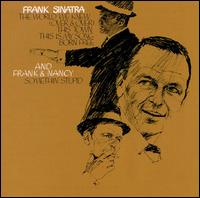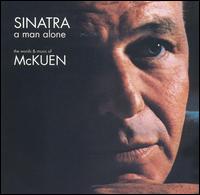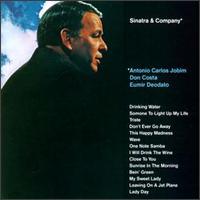Personnel
- Frank Sinatra - vocals (2, 4–6, 11–12, lead on 1, 3, 7–10)
- Don Costa - arranger (6, 11), [7] conductor (11) [13]
- Ernie Freeman - arranger, conductor (8–10) [3] [10] [11]
- Neal Hefti - conductor (12) [4]
- Billy May - arranger (7) [8]
- Marty Paich - arranger, conductor (2, 5) [2] [9]
- Nelson Riddle - arranger (1, 3–4, 6, 12), conductor (1, 3–4, 6–7) [6]
Tracks 1, 3, 7:
3-October-1964 (Saturday) - Hollywood. United Recording (from 3 to 7 P.M.).
Cappy Lewis (tpt); Ken Shroyer (b-tbn); John Cave, Richard Perissi, Vincent DeRosa (fr-h); Willie Schwartz, Harry Klee, Gene Cipriano, Plas Johnson, Chuck Gentry (sax/wwd); Emo Neufeld, Marshall Sasson, Victor Bay, Jacques Gasselin, Paul Shure, Joe Stepansky, Thelma Beach, Bonnie Douglas, Lou Raderman (vln); Virginia Majewski, Alvin Dinkin (via); Edgar Lustgarten, Anne Goodman, Armand Kaproff (vie); Ann Mason Stockton (harp); Bill Miller, Ray Sherman (p); Bobby Gibbons, Tommy Tedesco, Vincent Terri, Al Viola (g); Ralph Pena (b); Irving Cottler (d); Emil Richards (perc); a vocal chorus on all titles. Nelson Riddle, Billy May (arr).
Tracks 2, 5:
31-July-1963 (Wednesday) - Los Angeles. RCA Victor Studios (from 8 to 11 P.M.).
Al Porcino, Conte Candoli, Ray Triscari, Stu Williamson (tpt); Dick Nash, Richard Leith, Joe Howard, Gail Martin (tbn); Richard Perissi, Gene Sherry (fr- h); Ted Nash, Harry Klee (sax/fl); Paul Horn (sax/fl/cit); Bob Cooper, Jack Nimitz (sax/cl/b-clt); Gerald Vinci, James Getzoff, Amerigo Marino, Stanley Plummer, Lennie Malarsky, Anatol Kaminsky, Jacques Gasselin, Lou Raderman, Erno Neufeld, Paul Shure, Marvin Limonick, Israel Baker (vln); Virginia Majewski, Allan Harshman, Cecil Figelsky, LeRoy Collins, Louis Kievman, Stanley Harris (via); Eleanor Slatkin, Ray Kramer, Justin DiTullio, Armand Kaproff (vlc); Kathryn Julye (harp); Bill Miller (p); Al Hendrickson (g); Joe Mondragon (b); Irving Cottler (d); Dale Anderson (conga/tymp); Marty Paich (arr/cond).
Track 4:
21-January-1963 (Monday) - Hollywood. United Recording (from 9 P.M. to 12 M.).
Shorty Sherock, Cappy Lewis, Don Fagerquist, George Seaberg (tpt); Dick Noel, Tom Shepard, Dick Nash (tbn); George Roberts (b-tbn); Vincent DeRosa, John Cave (fr-h); Willie Schwartz, Harry Klee (sax/fl/cit); Gene Cipriano (sax/fl); Plas Johnson (sax/cit); Joe Koch (sax/b-clt); Felix Slatkin, Emo Neufeld, Marshall Sosson, Gerald Vinci, Paul Shure, Israel Baker, Victor Amo, Jacques Gasselin, Victor Bay, Alex Beller (vln); Paul Robyn, Stanley Harris, Allan Harshman (via); Eleanor Slatkin, Kurt Reher, Ray Kramer (vlc); Aida Dagort (harp); Bill Miller (p); Al Viola (g); Joe Comfort (b); Mel Lewis (d); Emil Richards (tymp).
Track 6:
8-April-1964 (Wednesday) - Hollywood. United Recording (7 to 10:30 P.M)
Shorty Sherock, Pete Candoli, Cappy Lewis, Harry Edison (tpt); Tommy Pederson, Tom Shepard, Dick Nash, Gail Martin (tbn); William Hinshaw, Gene Sherry (fr-h); Willie Schwartz, Harry Klee, Plas Johnson, Champ Webb, Joe Koch (wwd); Victor Amo, Lou Raderman, Paul Shure, Marshall Sosson, Jacques Gasselin, Arnold Belnick, Bonnie Douglas, Robert Konrad, Victor Bay (vln); Paul Robyn, Alex Neiman (via); Armand Kaproff, David Pratt, Anne Goodman (vlc); Kathryn Julye (harp); Bill Miller (p); Al Viola (g); Ralph Pena (b); Irving Cottler (d); Emil Richards (perc). Nelson Riddle, Don Costa (arr).
Tracks 8, 9, 10:
17-July-1964 (Friday) - Hollywood. United Recording (from 7 to 10:30 P.M.).
Robert Bryant (tpt); Buddy Collette (wwd); Victor Amo, Paul Shure, Lou Raderman, Sidney Sharp, Ralph Schaeffer, Lennie Malarsky, Arnold Belnick, William Kurasch, Joe Stepansky, Darrel Terwilliger, Jacques Gasselin, Marshall Sosson (vln); Alex Neiman, Gareth Nuttycombe, Joseph Di Fiore, Alvin Dinkin (via); Kurt Reher, Justin DiTullio, Emmett Sargeant, Anne Goodman (vie); Bill Miller, Gene Garf, Ray Sherman (p); Al Hendrickson, Bobby Gibbons, Tommy Tedesco (g); Joe Mondragon (b); Hal Blaine (d); Emil Richards (perc); a vocal group [l]. Ernie Freeman, Billy May (arr).
Track 11:
3-December-1963 (Tuesday) - Hollywood. United Recording (from 8 to 11 P.M.).
Dick Nash, Dick Noel, Hoyt Bohannon (tbn); George Roberts (b-tbn); Vincent DeRosa, John Cave, Richard Perissi (fr-h); Willie Schwartz, George Smith (sax/cit); Arthur Gleghorn, Harry Klee (sax/fl); Jules Jacob (sax/oboe); Jack Nimitz, Chuck Gentry (sax/b-clt); Emo Neufeld, James Getzoff, Gerald Vinci, Anatol Kaminsky, Jacques Gasselin, Alex Murray, Joe Stepansky, Nathan Ross, Bonnie Douglas, Israel Baker, Marshall Sosson, Lou Raderman, Paul Shure, Victor Amo (vln); Paul Robyn, Alvin Dinkin, Stanley Harris, Virginia Majewski (via); Edgar Lustgarten, Nino Rosso, Kurt Reher, Ray Kramer (vie); Kathryn Julye (harp); Carl Fortina (accordion); Bill Miller (p); Al Viola, Bobby Gibbons (g); Ralph Pena, Eddie Gilbert (b); Irving Cottler (d); Emil Richards (perc). Don Costa, Ernie Freeman (arr).
Track 12:
27-August-1962 (Monday) - Hollywood. United Recording (from 5 to 8 P.M.).
Conrad Gozzo, Al Porcino, Don Fagerquist, Stu Williamson (tpt); Dick Nash, Dick Noel, Harry Betts (tbn); Ken Shroyer (b-tbn); Richard Perissi, Arthur Maebe, Sinclair Lott (fr-h); Plas Johnson, Ronny Lang, Herman Gunkier (sax/fl); Joe Koch (sax/b-clt); Jules Jacob (sax/clt/b-clt); Erno Neufeld, James Getzoff, Jacques Gasselin, Israel Baker, Gerald Vinci, Amerigo Marino, Ben Gill, Carl LaMagna, Lennie Malarsky, Lou Klass (vln); Allan Harshman, Alex Neiman, Stanley Harris (via); Justin DiTullio, Joseph DiTullio, Nino Rosso (vie); Verlye Mills (harp); Bill Miller (p); Al Viola (g); Ralph Pena (b); Irving Cottler (d/chimes); Frank Flynn (tymp/bells). Nelson Riddle (arr). [14]
